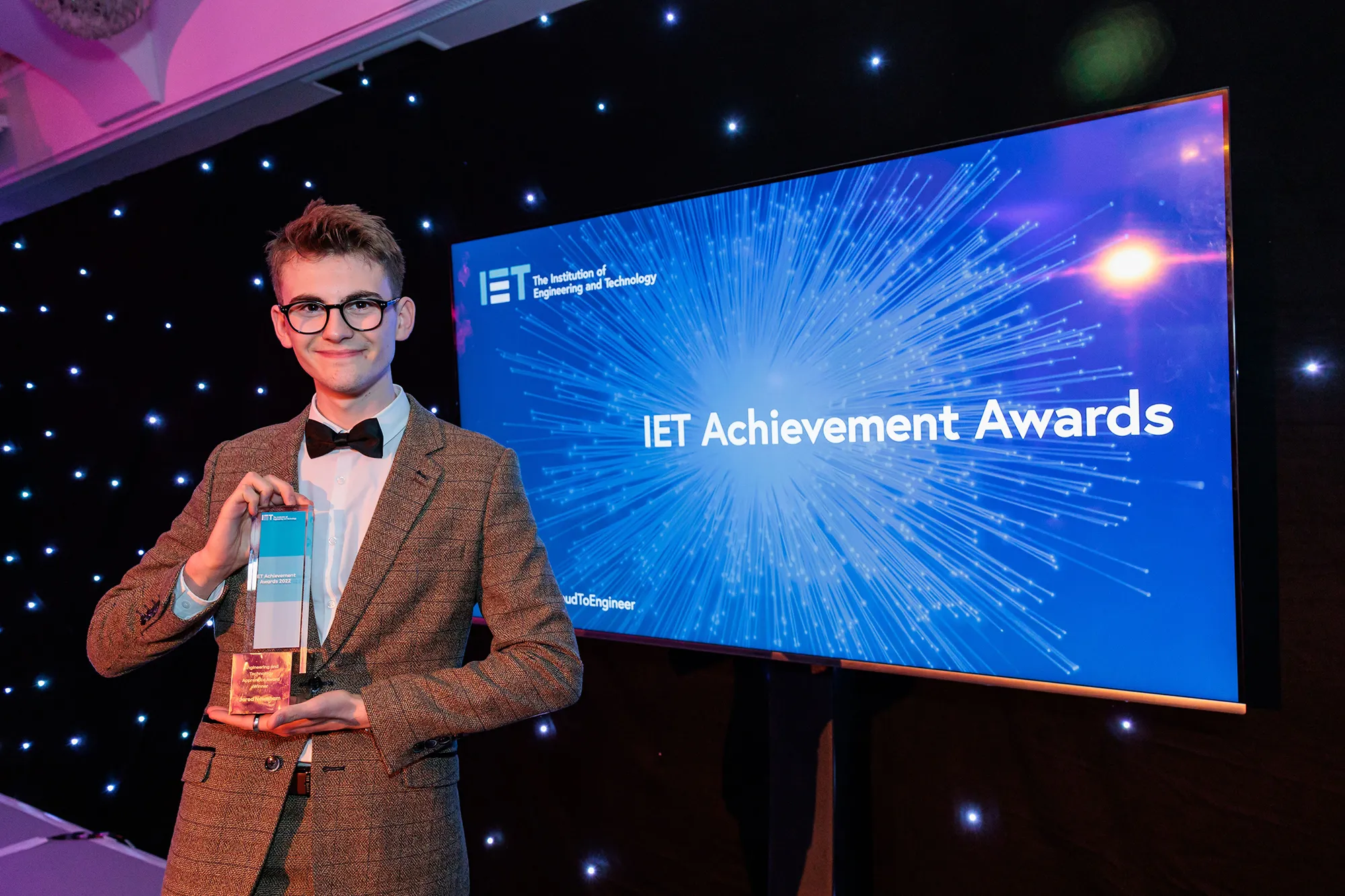Because your donation enables young engineers to make the most of their opportunities
IET Engineering Horizons Bursaries (now known as the Future Talent Awards) help young engineers get ahead – not just thanks to the financial support they provide, but also through the development opportunities they offer, as Jared Newnham explains.
Jared Newnham is an Aerospace Engineering Degree Apprentice at Defence Equipment and Support (DE&S), the procurement arm of the UK Ministry of Defence, and the recipient of an IET Engineering Horizons Bursary supported by The Engineers Trust
Through his experience, he believes awards such as these enable young engineers to exploit all their opportunities to the fullest.

“They might use the financial freedom to purchase a new laptop so they’ll have access to more professional engineering software, or work less shifts and instead spend the time they would be working concentrating on their studies,” he says.
“There are also great development opportunities. The outreach events and networking activities offered through the bursary are an exciting opportunity for me to develop a fuller understanding of the industry, as the only way that can be achieved is through exposure to a variety of people.”
Through his donor, The Engineers Trust, Jared has also received peer-to-peer mentoring with other bursary recipients.
“There are engineering apprentices and students, all from different companies and at different stages of their course. We hold these sessions every two to three months, and each has a focus. So far, we’ve discussed networking, mentoring opportunities and professional registration.”
In addition, Jared’s taking advantage of his IET membership which he received for free through the awards, to attend a variety of different seminars to support his CPD and learn more about other areas of engineering.
“I’ve been to a few different talks, for example one on the McMurtry Spéirling, a record-breaking electric single-seat car that used some scientific principles I was aware of, but in a different context. That was really useful,” he says.
Choosing an engineering degree apprenticeship
Jared had originally planned to study physics at university, but during sixth form he began to feel this wasn’t the right path.
“I wanted something with more substance,” he explains. “I eventually found engineering degree apprenticeships, which were a way for me to continue physics, but by applying it to solving technical problems.
“I’d never considered apprenticeships before; I’d wrongly thought they were only for people who were practically minded. The reality is that you still get that degree, but at the same time several years of real-world experience and no student debt!”
Originally from the Isle of Wight, Jared is now based in Bristol, studying one day a week at the University of the West of England (UWE), while the rest of his time is spent on placement. As part of the five-year course, he cycles through six-month placements with different DE&S teams.
“I get to work on the airworthiness of fast jets, helicopters, fixed-wing transport aircraft and remotely piloted air systems (RPAS). The apprenticeship is great in terms of breadth of experience, and we also come away with several qualifications; level 2 and 4 NVQs in engineering, and a bachelor’s degree in aerospace engineering.”
The potential bursaries have to offer
Jared first heard about the IET through his apprenticeship, and his manager encouraged him to investigate and apply for an IET Engineering Horizons Bursary. However, it wasn’t until a conversation with a past recipient that he realised the potential it had to offer.
“He was from a similar background to me so I could see how I could benefit, not just in terms of financial support but also networking opportunities and the chance to meet more like-minded young engineers,” he says.
For Jared, the biggest benefits have been from a development perspective, however the financial benefits cannot be ignored. In his case this was the opportunity to learn to drive. As a sixth former, Jared’s college was on the mainland and much of his money was spent paying for ferries to and from class, and so he didn’t have the funds to take driving lessons.
“Financially, the bursary helped me learn to drive. This may sound trivial or unrelated to engineering, but actually it made a big difference to my career. The reality is, it’s enabled me to access more engineering opportunities.
“In the aerospace defence industry visiting military sites is very important, but as you might guess, they’re often in rural locations that aren’t easy to access by public transport. Learning to drive has given me a new level of freedom and enabled me to more easily visit sites and spend time with all the engineering equipment.”
Developing a new generation of passionate engineers
As Jared shows, these awards and their related activities lead to an engaged, passionate generation of young engineers who are eager to share their love of engineering, inspire others and highlight the different pathways the industry has to offer.
“I’ve already participated in several events and am excited to attend more and speak on behalf of the IET to spread awareness of engineering opportunities,” he says.
Jared’s story shows why it’s so important for engineers and engineering companies to continue supporting the IET Futures Fund. In his own words; “your donations enable young engineers to really exploit their opportunities to the fullest.
“You cannot overestimate the impact of these awards. They allow us to explore our passions, cultivate our growth; really empower the engineering workforce – the people that are going to face some of the world’s biggest modern challenges. Having a more passionate, invigorated workforce means we’ll hopefully deal with these problems more effectively.”
